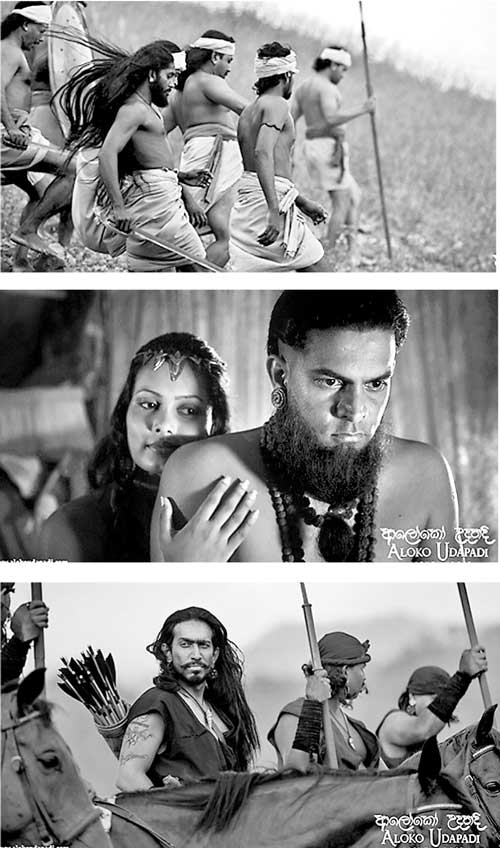Friday Feb 13, 2026
Friday Feb 13, 2026
Saturday, 13 May 2017 00:00 - - {{hitsCtrl.values.hits}}
It was an ideal Vesak treat for the Sri Lankans, particularly Buddhists, in Perth. A full house in one of the city’s suburban cinema halls watched ‘Aloko Udapadi’ screened as a fund-raising project for the Dhamma School of the Sri Lankan temple in Kenwick. The screening coincided with the completion of 100 days of its showing in Sri Lanka.
Based on the story of King Vattagamani Abhaya (Valagamba 103-102/89-77 BCE), the film climaxes in the writing of the Tripitaka which Professor Senerat Paranavitana refers to as “the greatest contribution that the Sinhalese people had made to the intellectual heritage of mankind”. 
The preservation of the Theravada Canon in the Pali language happened when the monks faced a grave crisis with incessant attacks by the Cholas aided by a local Brahmin leader killing both the innocent laymen and the clergy thereby the numbers were dwindling, as well as by deaths caused by a severe famine.
The film is packed with battles, palace intrigues, killings and suffering by the masses. It has provided an opportunity to display the ancient martial art of ‘angampora’ combining combat techniques, self-defence, sport, exercise and meditation.
The film is the creation of a father-son combination – a seasoned name in the local film world, Saman Weeraman writing the screenplay and his son Chathra directing the film along with Baratya Hettiarachchi – both newcomers to the film scene. Obviously, the writing of the script would have meant a lot of research although much of it would naturally have been based on the Mahavamsa, the Great Chronicle.
The period following the death of Saddahtissa (137-119 BCE), younger brother of hero king Dutugemunu (161-137), had witnessed several dissensions in the royal family. When Valagamba, the youngest of Saddhatissa’s sons, ascended the throne there were numerous enemies with a young Brahmana named Tiya ruling from Ruhuna. He had his eyes on Anuradhapura where the monarch ruled, when a Tamil army led by seven chiefs landed forcing Valagamba to flee. He was given shelter by the monks in a cave. The story continues in the film.
Done more on a ‘docu-feature’ style, the script somehow does not highlight Valagamba’s role to the extent where one is convinced that his was a tough task. Uddika Premaratne, (he was impressive in ‘Samanala Sandwaniya’ and ‘Maharaja Gemunu’) turns out yet another creditable performance as Valagamba playing a subdued role most of the time.
Buddhadasa Withanachchi is a perfect Thera Mahatissa. So is Samnu Kasun as Godatta Thera who transforms from a dutiful bhikkhu to a fighter to save the nation. Roshan Ravindra (Tiya) does his role well. In a brief appearance, W. Jayasiri (Nigantha Giri) proves his calibre as a top level actor. Acting overall is quite good.
With so much scope in the area of photography, Prabath Roshan is able to create an impact. He is aided by technology not often seen in Sinhala films yet. I am not competent to talk about the technology used. From an average viewer’s perspective, the film, on the whole, is lovely to watch.
With several new faces showing their creative ability in filmmaking in the recent past, the future looks quite bright for the industry in Sri Lanka. It’s so encouraging to see more and more youngsters getting interested in furthering their talent through higher studies.
A word about music in ‘Aloko Udapadi’. Newcomer Milinda Tennakone’s music score fits in perfectly with the moods of the film. The lyrics of the two songs written by Ven Rambukana Siddhartha are classy. Milinda’s melodies are equally good. The songs are beautifully sung by Amarasiri Peiris and Samantha Perara (both ‘golayas’ of maestro Khemadasa). Samantha sings the patriotic song, ‘Edi binda – Mana banda – Valagamba – Naraninda’ promoting the need for unity when the king comes out and gives leadership to gather the people and train them getting ready to face the enemy.
The other, Sasara maga dige – Galaa basina – Sadaham ganga’ sung by Amarasiri is a tribute to the great service done by the monks in converting the teachings of the Buddha into writing.
The words reverberated as we walked out of the theatre.